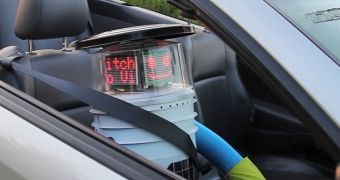We've been saying on and off how odd it is that humanoid robots never seem to come out quite the way we want, while flying-capable drones advance at breakneck speeds. Now, though, we can talk (or, rather, write) about a ground-based bot that managed to travel across an entire country.
HitchBOT is a pretty hilarious example of what can happen when you turn an experimental robotic technology into an exercise in hilarity.
After all, the thing looks like something out of a kids' cartoon, with a cylindrical body and arms that look suspiciously like tubes, plus a weird, flat hat.
Then again, that was part of the point. The makers of the HitchBOT wanted it to be something that would catch the eye of drivers on the highway, but without putting them off the idea of offering a ride.
Anyway, the HitchBOT was created and given the quest to cross the entirety of Canada, from Halifax, Nova Scotia to Victoria, British Columbia. Alas, robots cannot get driver's licenses, so the robot had to hitchhike the entire way.
The journey spanned 4,000 miles (6,437 km) and took its toll on HitchBOT. By the end of it (he only completed it this past Saturday), he had a cracked LED protector and his speech capability had diminished significantly.
Before you get the wrong idea, this wasn't a case of a person wearing a weird suit, or a robot that always had a remote operator within a hundred yards.
No, this really was an independent robot. And it wasn't that sophisticated either. More like a GPS machine on legs, and with a speaker that told passers-by where it had to go.
HitchBOT's adventure was not without its positive highlights though. Not only did it crash a wedding in British Columbia, but it attended a powwow in Northern Ontario and danced the Harlem Shake in Saskatchewan (well, it tried to at least).
All in all, it achieved a lot more than what its creators from the McMaster University expected. Indeed, they didn't really think the bot would complete the trip, let alone become internationally famous before it even finished it, random speech glitches aside.
We wonder what HitchBOT would really think of all this, and of being used as a way to show countries that technology is nothing to fear. Alas, with its basic hardware, it's unlikely to spontaneously develop sentience, so we'll have to live with the uncertainty of its likely or unlikely opinions.

 14 DAY TRIAL //
14 DAY TRIAL //